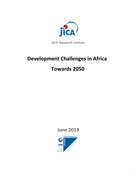Development Challenges in Africa Towards 2050

JICA-RI released a report, Development Challenges in Africa Towards 2050 for the Fifth Tokyo International Conference on African Development (TICAD V). The Institu
te, outsourcing the research to Centennial Co., Ltd. in the United States, has been working on the project together. The year 2050 seems so far ahead, but the governments of African countries and their development partners need to develop the specific policies immediately if they aim to realize better economies and societies in about 40 years.
The report, with econometric models, sets up a long-term prospect of economy, demography, and poverty, laying out the three scenarios. The best scenario is that average annual income per capita will be US$17,000 in 2050, whereas the worst scenario remains at US$6,000. The report, in light of the vision, aims to serve as a catalyst for thinking of how to guide African countries to the better future with policies to be implemented now.
The report introduces a number of key issues. It is predicted that Africa will encounter burgeoning population and accelerating urbanization towards 2050. Thus creating jobs continuously to absorb the redundant labor force will be a key factor for the stability in economic and social order. Africa’s current economic structure, counting on fossil fuels and mineral resources, are capital-intensive, which can’t expect to create many job opportunities. The transformation of economic structure in Africa will be a crucial challenge to keep sustainable growth, as well as to utilize the private sector. It is hoped that each African country will shift the economic structure to more sustainable one, while developing market and investment climate where the private sector can thrive, as well as systematically fostering human capital by enriching educational and health services.
scroll